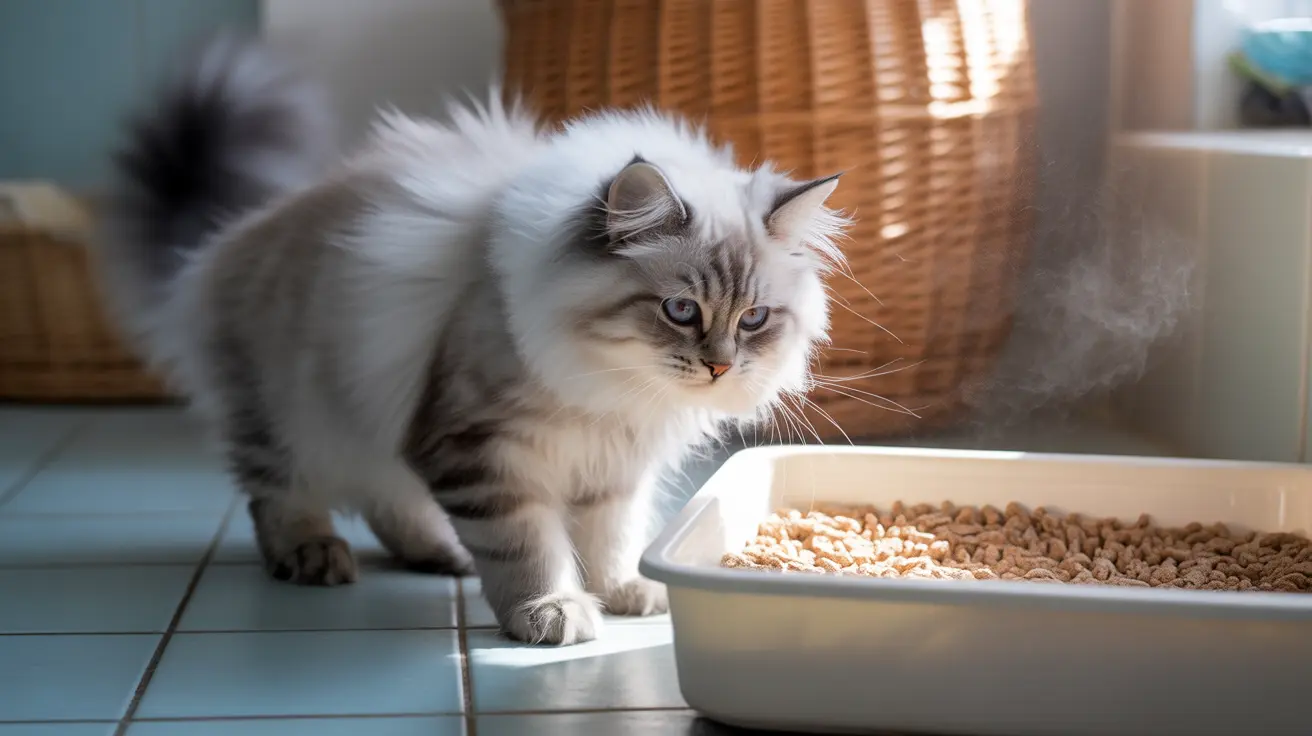Chronic Diarrhea in Cats: Understanding Causes, Diagnosis, and Effective Treatment Options
Chronic diarrhea in cats is more than just an occasional digestive upset—it's a persistent condition that can significantly impact your feline companion's health and quality of life. Characterized by frequent or persistent soft stools lasting several weeks or longer, chronic diarrhea in cats serves as an important clinical sign indicating possible intestinal or systemic disease that warrants immediate veterinary attention.
Unlike acute diarrhea that resolves within a few days, chronic diarrhea persists and often points to underlying health issues that require professional diagnosis and targeted treatment. Understanding the various causes, recognizing the symptoms, and knowing when to seek veterinary care can make the difference between effective management and prolonged suffering for your cat.
This comprehensive guide will explore the multifaceted nature of chronic diarrhea in cats, from identifying the underlying causes to navigating the diagnostic process and implementing effective treatment strategies. By the end of this article, you'll be equipped with the knowledge needed to work collaboratively with your veterinarian to restore your cat's digestive health.
Understanding the Types and Characteristics of Chronic Diarrhea
Chronic diarrhea in cats can originate from different parts of the digestive system, and understanding these distinctions helps veterinarians pinpoint the underlying cause. The location of the problem—whether in the small intestine or large intestine—produces different symptoms that serve as valuable diagnostic clues.
Small Bowel vs. Large Bowel Diarrhea
Small bowel diarrhea typically involves larger volume stools with normal or only mildly increased defecation frequency. Cats with small bowel issues may experience weight loss despite having an increased appetite, and their stools may appear black or tarry if blood is present due to digestion in the upper digestive tract. This type of diarrhea often indicates problems with nutrient absorption or digestive enzyme function.
Large bowel diarrhea presents differently, featuring smaller volume stools with significantly increased defecation frequency. Cats may show signs of straining, urgency, and their stools often contain mucus and bright red blood. This pattern typically suggests inflammation or irritation in the colon or rectum, making it easier for owners to recognize as an immediate concern.
Common Causes of Chronic Diarrhea in Cats
The underlying causes of chronic diarrhea in cats are diverse and can range from simple dietary issues to serious systemic diseases. Understanding these potential causes helps cat owners recognize risk factors and work more effectively with their veterinarians during the diagnostic process.
Inflammatory Bowel Disease (IBD)
Inflammatory bowel disease represents one of the most common causes of chronic diarrhea in cats. This condition involves immune cells infiltrating the intestinal tissue, creating persistent inflammation that interferes with normal digestive function. IBD can manifest in several forms, each requiring different diagnostic and therapeutic approaches.
Parasitic Infections
Intestinal parasites such as Giardia and Tritrichomonas foetus are frequent culprits in chronic diarrhea cases. These microscopic organisms can be particularly challenging to detect, as a single fecal test may miss active infestations. Multiple fecal samples collected over several days significantly improve parasite detection sensitivity, making thorough testing essential for accurate diagnosis.
Infectious Diseases
Both bacterial and viral infections can cause chronic diarrhea in cats. Bacterial infections from organisms like Campylobacter, Salmonella, and Clostridium may persist without proper treatment. Viral infections, particularly feline leukemia virus (FeLV) and feline immunodeficiency virus (FIV), can compromise immune function and lead to chronic digestive issues that require ongoing management.
Food Allergies and Intolerances
Food allergies or intolerances represent another significant cause of chronic diarrhea in cats. Unlike immediate allergic reactions, food-related digestive issues often develop gradually and may not be immediately connected to dietary changes. These sensitivities can develop to proteins or other ingredients that cats have consumed without problems for extended periods.
Systemic Diseases
Various organ diseases can manifest as chronic diarrhea, including liver disease, kidney disease, pancreatitis, and hyperthyroidism. These conditions affect the body's overall function and can disrupt normal digestive processes. Early detection through appropriate blood tests often leads to better treatment outcomes and may resolve diarrhea when underlying conditions are properly managed.
Diagnostic Process: What to Expect During Veterinary Evaluation
Diagnosing chronic diarrhea in cats requires a systematic approach that begins with a thorough history and physical examination, followed by targeted diagnostic testing based on clinical findings.
Medical History and Clinical Assessment
The diagnostic process starts with a detailed history that includes symptom duration, stool appearance and frequency, dietary changes, vaccination and worming history, exposure to toxins, stress factors, and concurrent symptoms such as vomiting, weight loss, or dehydration. This information helps veterinarians narrow down potential causes and develop an appropriate diagnostic plan.
Physical examination focuses on assessing hydration status, abdominal palpation for masses or thickened intestines, checking for lymphadenopathy, performing rectal examination, and thyroid palpation. These hands-on assessments can reveal important clues about the underlying condition causing chronic diarrhea.
Laboratory Testing and Imaging
Comprehensive diagnostic testing typically includes a complete blood count (CBC), serum biochemistry profile, urinalysis, and thyroid hormone measurement to identify systemic diseases. Fecal testing involves flotation and direct smear examination to identify parasites, along with specialized ELISA or PCR testing for Giardia and Tritrichomonas, which may not be detected through routine microscopic examination.
Infectious disease screening for FeLV and FIV is particularly important in cats with persistent diarrhea, as these viruses can compromise immune function and lead to chronic digestive issues. Abdominal imaging through radiographs and ultrasound helps detect masses, obstructions, or structural abnormalities that may contribute to chronic diarrhea.
In complex cases, endoscopy with biopsy of the gastrointestinal mucosa may be necessary to definitively diagnose inflammatory bowel disease or rule out intestinal neoplasia including lymphoma. This procedure allows direct visualization of the intestinal lining and collection of tissue samples for microscopic examination.
Food Allergy Testing: The Elimination Diet Approach
When food allergies or intolerances are suspected, veterinarians typically recommend an elimination diet trial lasting 3 to 8 weeks. This process requires strict adherence to a diet containing novel proteins or hydrolyzed proteins that the cat has never consumed before, eliminating all other food sources including treats, flavored medications, and table scraps.
Success with elimination diets depends entirely on owner compliance, as even small amounts of offending ingredients can perpetuate symptoms and invalidate the trial. Common allergens in cat food include beef, dairy products, fish, and certain grains, though cats can develop sensitivities to virtually any protein source they've been exposed to previously.
During the elimination diet trial, owners must carefully monitor their cat's response, noting changes in stool consistency, frequency, and overall well-being. If symptoms improve during the trial period, individual ingredients can be gradually reintroduced to identify specific triggers, allowing for long-term dietary management.
Treatment Approaches for Different Types of IBD
Inflammatory bowel disease in cats encompasses several distinct conditions, each requiring tailored treatment approaches based on the specific type of inflammation present in the intestinal tissue.
Lymphocytic-Plasmacytic Enteritis
This most common form of IBD often responds well to dietary management combined with parasite control measures. Many cats with lymphocytic-plasmacytic enteritis show improvement with highly digestible diets, probiotics, and vitamin B12 supplementation to support intestinal health and restore normal digestive function.
Eosinophilic Enteritis
Eosinophilic enteritis typically requires more aggressive treatment with corticosteroids and may necessitate lifelong immunosuppressive medication to control inflammation. This form of IBD can be particularly challenging to manage and often requires ongoing monitoring to adjust treatment protocols based on the cat's response.
Granulomatous Enteritis
The most severe form of IBD, granulomatous enteritis, may cause significant thickening of the intestinal walls, potentially requiring surgical removal of obstructed segments when medical management alone proves insufficient. This condition often carries a more guarded prognosis and may require intensive medical intervention.
Stress-Related Digestive Issues and Management Strategies
Stress-induced irritable bowel syndrome can contribute to chronic diarrhea in cats, particularly in multi-pet households or following significant environmental changes. Managing stress-related digestive issues involves identifying and addressing environmental triggers while implementing behavioral modifications to support gastrointestinal health.
Environmental enrichment, consistent routines, and gradual introduction of changes can help reduce stress-related digestive symptoms. In some cases, anti-anxiety medications or pheromone therapy may be beneficial as adjunct treatments alongside traditional digestive therapies.
Preventive Measures and Long-Term Management
Preventing chronic diarrhea involves maintaining good parasite control through regular deworming and fecal examinations, avoiding abrupt dietary changes, preventing ingestion of inappropriate items, and managing environmental stress. Regular veterinary check-ups help detect underlying conditions before they progress to chronic stages.
Long-term management of cats with chronic diarrhea requires ongoing monitoring of stool volume, character, frequency, and body weight, along with regular veterinary follow-up to assess treatment effectiveness and adjust protocols as needed. Home management should always be guided by veterinary recommendations, as many over-the-counter medications can be toxic to cats.
Prognosis and Quality of Life Considerations
The prognosis for cats with chronic diarrhea varies significantly depending on the underlying cause. Some conditions resolve completely with appropriate therapy, while others require lifelong management to maintain quality of life. Early detection and treatment generally improve outcomes, emphasizing the importance of prompt veterinary attention when chronic diarrhea develops.
Successful management often involves a combination of targeted medical therapy, dietary modification, and supportive care tailored to each cat's specific needs. With proper veterinary guidance and owner commitment to treatment protocols, most cats with chronic diarrhea can achieve significant improvement in their digestive health and overall well-being.
Frequently Asked Questions
- How long does diarrhea need to persist before it's considered chronic in cats?
Diarrhea is typically considered chronic when it persists for several weeks or longer. If your cat has had loose stools for more than two to three weeks, it warrants veterinary evaluation to identify underlying causes and prevent complications from prolonged digestive upset.
- Can I give my cat over-the-counter anti-diarrheal medications?
No, you should never give your cat over-the-counter anti-diarrheal medications without veterinary guidance. Many human medications can be toxic to cats, and suppressing diarrhea without addressing the underlying cause can actually worsen the condition and mask important diagnostic symptoms.
- How many fecal samples does my veterinarian need to accurately test for parasites?
Multiple fecal samples collected over several days significantly improve parasite detection sensitivity, as a single test can miss active infestations. Your veterinarian may request 2-3 samples collected on different days to ensure accurate parasite screening.
- What should I do if my cat's elimination diet trial isn't working?
If symptoms don't improve during a properly conducted elimination diet trial lasting 3-8 weeks, food allergies may not be the cause of your cat's chronic diarrhea. Contact your veterinarian to discuss other potential causes and diagnostic approaches, as the condition may require different treatment strategies.
- Are certain breeds of cats more prone to chronic diarrhea?
While chronic diarrhea can affect any cat, some conditions like inflammatory bowel disease may have breed predispositions. However, the condition is more commonly related to individual factors such as diet, stress, parasites, or underlying diseases rather than breed-specific susceptibilities.
- How long does it typically take to see improvement once treatment begins?
Response time varies depending on the underlying cause and treatment approach. Some cats show improvement within a few days of starting appropriate therapy, while others may require several weeks to months for full resolution. Your veterinarian will provide specific timelines based on your cat's diagnosis and treatment plan.
- Can chronic diarrhea in cats be cured completely?
The potential for complete cure depends entirely on the underlying cause. Parasitic infections and some bacterial causes can be completely eliminated with appropriate treatment, while conditions like inflammatory bowel disease may require lifelong management. Early diagnosis and proper treatment generally lead to better outcomes and improved quality of life.






